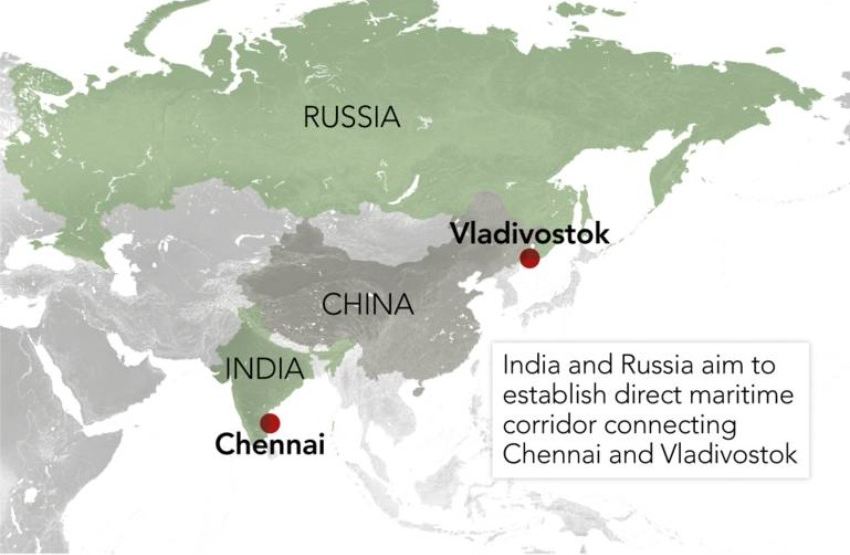International Relations
India-Russia Foreign Ministers Meet
- 08 Apr 2021
- 6 min read
Why in News
To build on the common “resilient” ground, Indian and Russian Foreign Ministers addressed each other’s concerns on a wide range of issues.
- The issues range from defence supplies to the S-400 air defence system, India’s role in Afghanistan and Taliban’s involvement in power-sharing to cooperation on Covid vaccines and India’s participation in the Quad grouping.
Key Points
- Discussed Cooperation in Following Sectors:
- Economic opportunities in the Russian Far East.
- The Russian Far East stretches from Lake Baikal, the world’s largest freshwater lake, to the Pacific Ocean and comprises roughly a third of Russia’s territory.
- Although it is rich in natural resources including minerals, hydrocarbons, timber and fish, it is an economically underdeveloped region.
- Leveraging the Atmanirbhar Bharat campaign to boost manufacturing in India.
- Connectivity through the International North-South Transport Corridor (INSTC).
- INSTC is a multi-modal transportation established in September 2000 in St. Petersburg, by Iran, Russia and India for the purpose of promoting transportation cooperation.
- The Chennai-Vladivostok Eastern maritime corridor.
- Itr is a maritime route covering approximately 5,600 nautical miles, aimed at increasing bilateral trade between India and Russia.
- Long standing partnership in space and nuclear sectors.
- Economic opportunities in the Russian Far East.
- S-400 Air Defence System:
- Issues regarding the sale of the S-400 air defence system figured in the discussions.
- The S-400 Triumf is a mobile, surface-to-air missile system (SAM) designed by Russia.
- It is the most dangerous operationally deployed modern long-range SAM (MLR SAM) in the world, considered much ahead of the US-developed Terminal High Altitude Area Defense system (THAAD).
- While India is keen on buying it, the USA has expressed reservations by threatening sanctions under Countering America’s Adversaries Through Sanctions Act (CAATSA).
- Issues regarding the sale of the S-400 air defence system figured in the discussions.
- Views on Military Alliance and Indo-Pacific:
- Military Alliance:
- Russian Foreign Minister clarified that the Russia-China relations are at the highest in the history, but these relations do not pursue a goal of establishing a military alliance.
- He also referred to the Quad grouping and called it an “Asian NATO”, a term sometimes used by China.
- Quadrilateral Security Dialogue (Quad) is an informal strategic dialogue between India, USA, Japan and Australia with a shared objective to ensure and support a “free, open and prosperous” Indo-Pacific region.
- Indo-Pacific:
- Russia and India are working for stability and connectivity in the Asia-Pacific and urged that “military alliances” should not come up in Asia.
- Russia referred to the formulation of “Asia Pacific” while India referred to “Indo-Pacific”.
- Military Alliance:
- Afghan Peace:
- There is a need to “harmonise” the interests of various stakeholders that are active in and around Afghanistan.
- The peace process should be based on foundational principles and a political solution should mean independent, sovereign, united and democratic Afghanistan.
- Decision on the settlement in Afghanistan should foresee the participation of all political, ethnic and religious groups in the country. Otherwise the solution will not be stable.
- It needs to be noted that India was not a part of a recent meeting led by Russia on Afghan peace.
- Medical Cooperation:
- The Russian Fund for Direct Investment has signed contracts with various Indian manufacturers for Sputnik V vaccines for 700-750 million doses.
- Both ministers also took up the possible export of the Covaxin to Russia which is likely to be cleared by experts.
India - Russia Relations
- Political (Annual Summit): The Annual Summit meeting between the Prime Minister of India and the President of the Russian Federation is the highest institutionalized dialogue mechanism in the strategic partnership between India and Russia.
- Economic: India-Russia trade, amounting to USD 10.11 billion in 2019-2020, is far below the potential. Both countries have set the bilateral trade target at USD 30 billion by 2025.
- Defence and Security: BrahMos Missile System as well as the licensed production in India of SU-30 aircraft and T-90 tanks, are examples.
- Cooperation in Nuclear Energy: Kudankulam Nuclear Power Plant (KKNPP) is being built in India with Russian cooperation.
- Cooperation in Space Sector: Cooperation in Gaganyaan program.
- Common Multilateral Forums:
- Military Exercises:
- Exercise TSENTR 2019.
- Indra Exercises - Joint Tri-Services (Army, Navy, Air Force) Exercises.
Way Forward
- India Engaging Russia Into Indo-Pacific Narrative: India should pursue and facilitate Russia’s engagement in the Indo-Pacific.
- Russia’s active engagement in the region would contribute to making the Indo-Pacific truly “free and inclusive”.
- Prioritizing RIC in Indian Foreign Policy: India can also promote a mutually beneficial trilateral cooperation between Russia, China, and India that could contribute towards the reduction of mistrust and suspicion between India and China.







